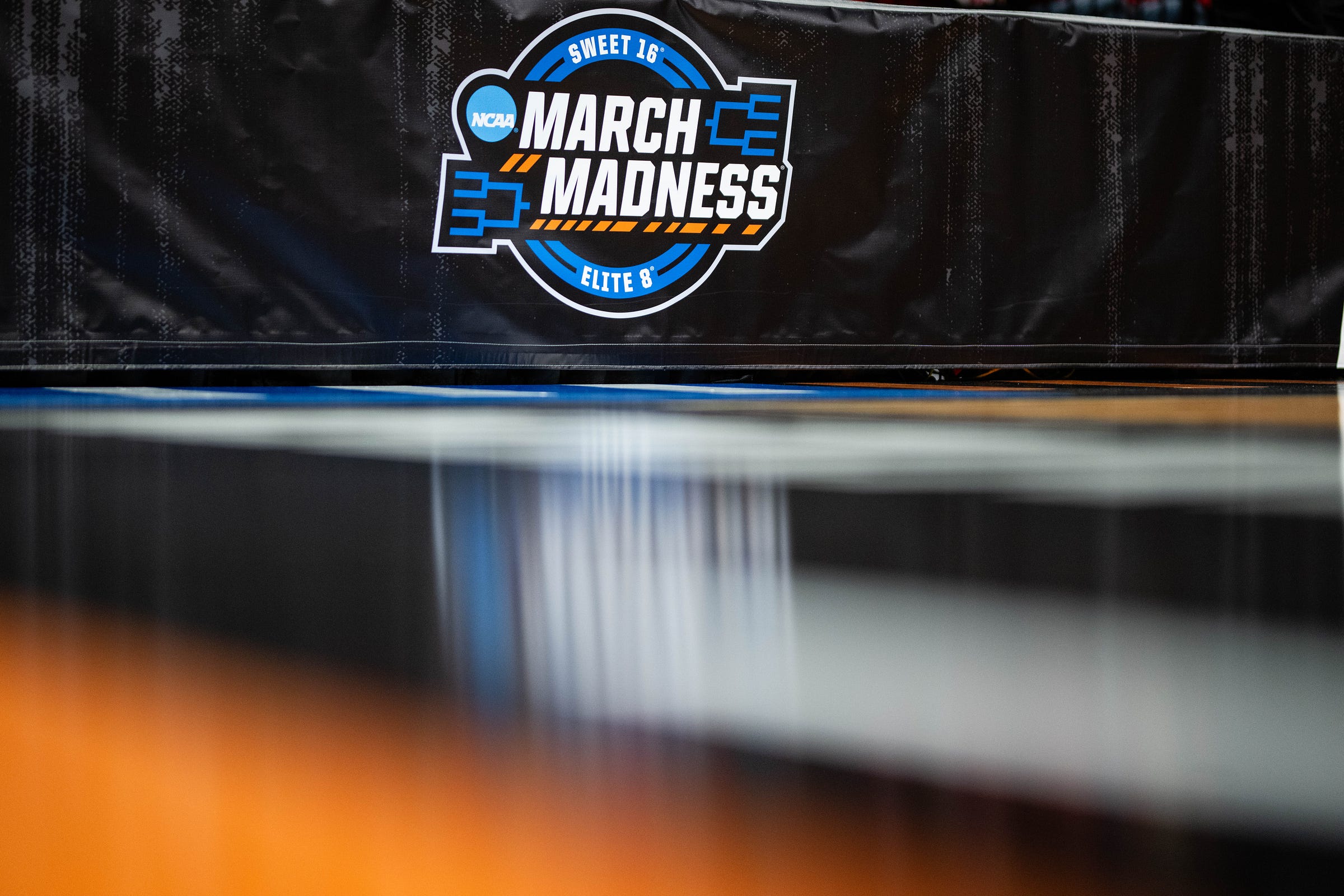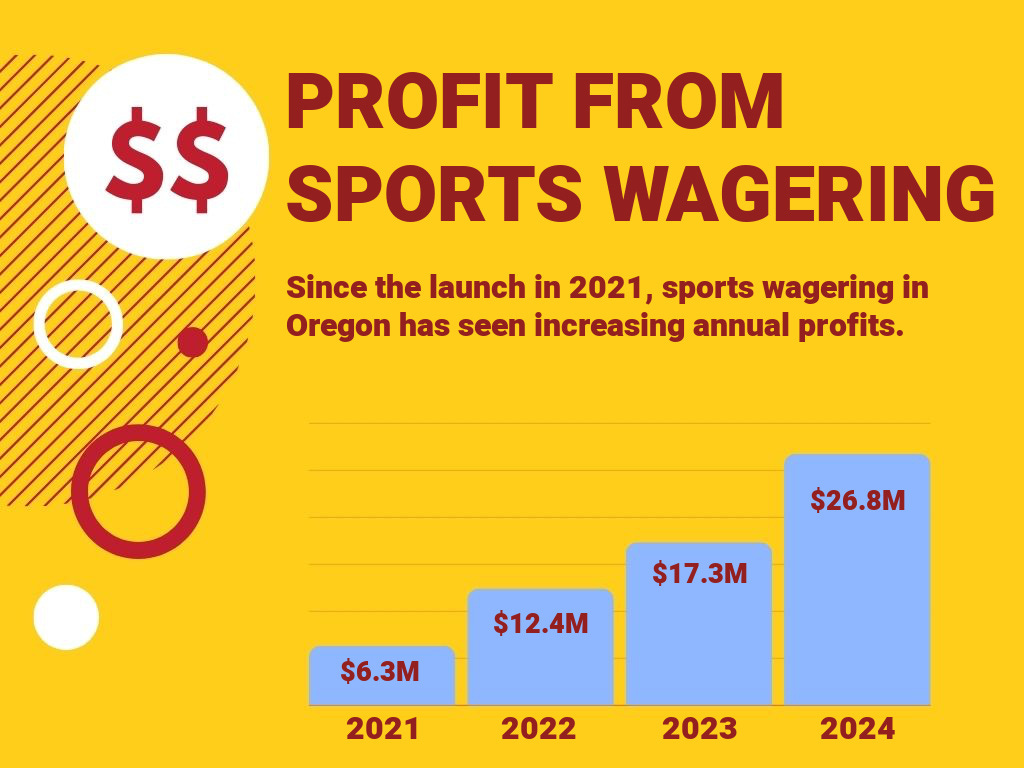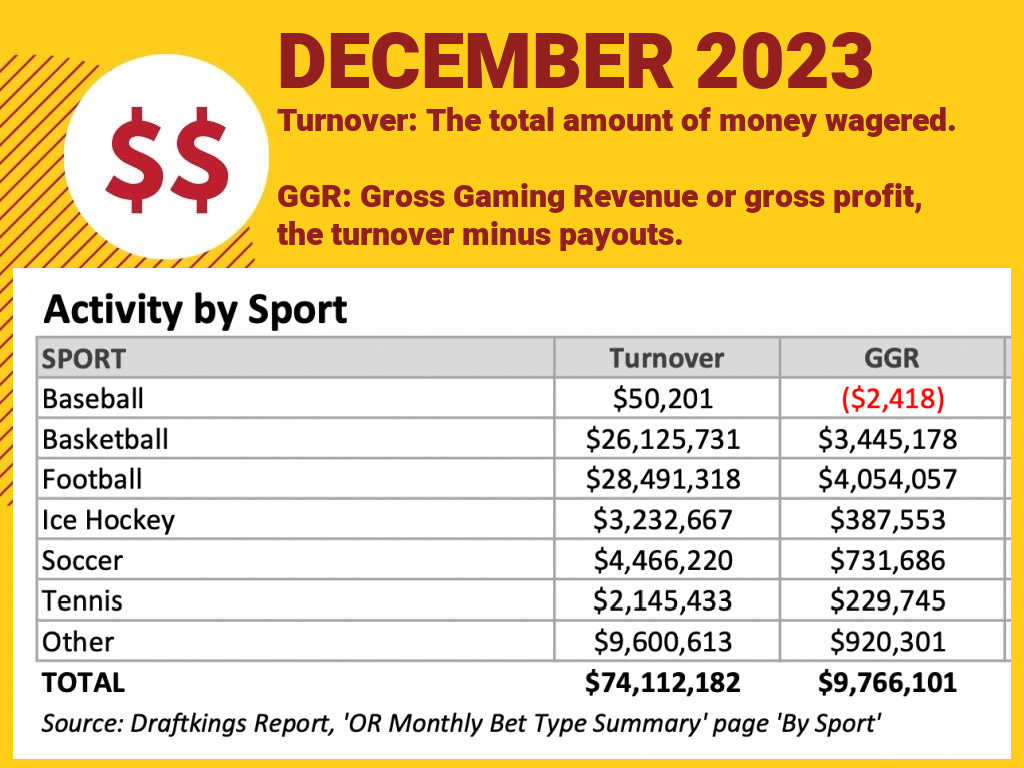Canzano: Madness in the sports betting business
State should allow wagering on college sports.
Public schools in Oregon theoretically won big in the last fiscal year. So did state parks, veteran’s organizations, and the natural habitat.
Legalized sports wagering has quietly become a booming business in the state. And if the profits ended up where they were intended to go, sports wagering has been a massive win for Oregon.
Documents obtained by JohnCanzano.com underscore the operation’s success. In the fiscal year ending June 30, DraftKings — The Oregon Lottery’s sports wagering partner — funneled $26.8 million in profit into the state’s pockets.
It set a record, clobbering the $17.3 million earned from sports wagering the prior year. Sports gambling has been so profitable for the Oregon Lottery since its launch in 2021 that it raises a question for state legislators.
How much bigger could it be?
In Oregon, bettors can wager on the NFL, MLB, NHL, and NBA games. They’re able to place bets on outcomes in tennis, cricket, soccer, go-kart races, and darts, among other things. But what the public can’t do is make a legal wager on a college sporting event, a disadvantage that curbs profits and sends consumers to off-shore sites and tribal casinos.
No March Madness.
No college football, either.
It makes no sense. It’s a conversation I had frequently with Peter Courtney, the long-time Oregon lawmaker who died last month. For years, Courtney opposed legalized sports wagering, but the president of the state senate warmed to the notion as he saw national attitudes change and recognized the local financial benefits. Before he retired, Courtney wondered if sports wagering might be used to help fund college education for those who couldn’t afford it.
It’s why Courtney introduced HB-1503 in his final legislative session in 2022. The proposed law ran into opposition from lobbyists working on behalf of the state’s tribal casinos. They called for a task force and a commissioned study. The bill ended there.
A commissioned study?
A task force?
“It’s political code for ‘Kill the bill. Kill the bill,’” Courtney told me at the time. “These studies drive me crazy. These task forces drive me crazy. I didn’t come here to do a study, I came here to vote and make public policy. That’s exactly what that was. They came at me hard and they beat me. I lost. I got beat. I’m really down about that.”
The only other time I heard Courtney as defeated was last August when the trustees at the University of Oregon voted to accept the Big Ten Conference’s invitation. Courtney understood why the move made financial sense for the Ducks but hated that doing so left Oregon State’s athletic department in a lurch.
Weeks later, Beavers Athletic Director Scott Barnes and President Jayathi Murthy testified in front of the state, requesting $10 million for athletic scholarships. Lawmakers allocated the money to OSU in an unprecedented move.
College athletics is shifting. Multiple states have changed laws in the last few years, allowing financial compensation and NIL deals for athletes. Lawmakers in those states are doing all they can to avoid fostering competitive disadvantages for their public universities. The landscape is fierce. A successful college athletic department boosts enrollment, fosters national branding, and is a source of campus pride.
I’m just spitballing here, but Oregon should take another look at HB-1503 in the next session. It should legalize sports wagering for college events. The revenue could be used, as Courtney intended, to create some scholarships for low-income students. But given the strong financials I saw this week, I’m left with a wild idea. The revenue from college sports wagering could be used to give the athletic departments of the state’s public universities a boost and let taxpayers off the hook.
Oregon State stood to receive $30 million a year in media rights distributions had the Pac-12 remained intact. That money is long gone. Instead, OSU was left to sell its seven football games to The CW and Fox. Educated guesses place the revenue gained from that deal around $7.5 million, which is partly why the Beavers showed up in Salem asking for a subsidy.
Oregon will receive a 50 percent distribution in the Big Ten over the next six years. Oregon State needs to continue to fund like a Power 4 university while it plots its future. Portland State’s athletic department faces an existential crisis every time the budget is baked. And the various community college athletic departments in the state could use an infusion of cash.
Meanwhile, in May of this year, bettors using the DraftKings platform in Oregon set a record for the biggest month since the launch.
Total wagered: $76 million.
It was a massive jump from the $41 million bet during the previous May. The boost was driven by a robust betting market during the NBA playoffs ($27 million) and an uptick on baseball wagering, which drove $19 million in bets.
The only surprise was that the old monthly record set in December of 2023 — which generated $74 million in bets — wasn’t even bigger. After all, the two most popular sports by activity (basketball and football) overlap in December.
Those two sports are easily the two biggest individual generators of bets in Oregon. NFL games resulted in $28.5 million in wagers in December 2023 (see chart below). That “turnover” generated “gross gaming revenue” of more than $4 million for the operator. Betters using the DraftKings platform placed $26 million in bets on the NBA during the same month, good for $3.4 million in profit.
The Oregon Lottery collects a cut of the proceeds every fiscal year. DraftKings keeps the rest. March Madness and the College Football Playoff are missed opportunities for the operation.
Lawmakers in Oregon will eventually pass legislation allowing wagers on college sporting events. It’s bound to happen. But should ask itself some questions today.
Why wait a day longer? Who should wagering on college events benefit the most? Does it make sense to use that revenue — and not tax dollars — to help fuel athletic scholarships and the respective NIL collectives at the schools?
The lobbyists are going to hate this column. They’ll call for more studies and want to form a task force. They’ll tell me to shut my trap and stay in my lane. But I’m looking at the gains from the state lottery’s sports-gaming venture and thinking that the profits could be used to do even more.
Thank you for reading. I appreciate all who support, subscribe, and share this independent endeavor with friends and family. If you haven’t already — please consider subscribing and/or gifting a subscription to someone who would enjoy it.
This is an independent reader-supported project, with both free and paid subscriptions. Those who opt for the paid edition are providing vital assistance to bolster my independent coverage.





Crazy that I can’t bet NCAA sports here in Oregon, but I can legally possess heroin, fentanyl, meth, pcp, shrooms, acid, and oxys. Great governing.
Walk into any low end bar, tavern, or "deli" in Oregon and look at the poor souls hunched over the electronic blackjack maxing out their cards before they get to Freddys. Nothing to be admired about gambling (I know, I know) except the life blood it drains out of society. Just sayin', Charlie